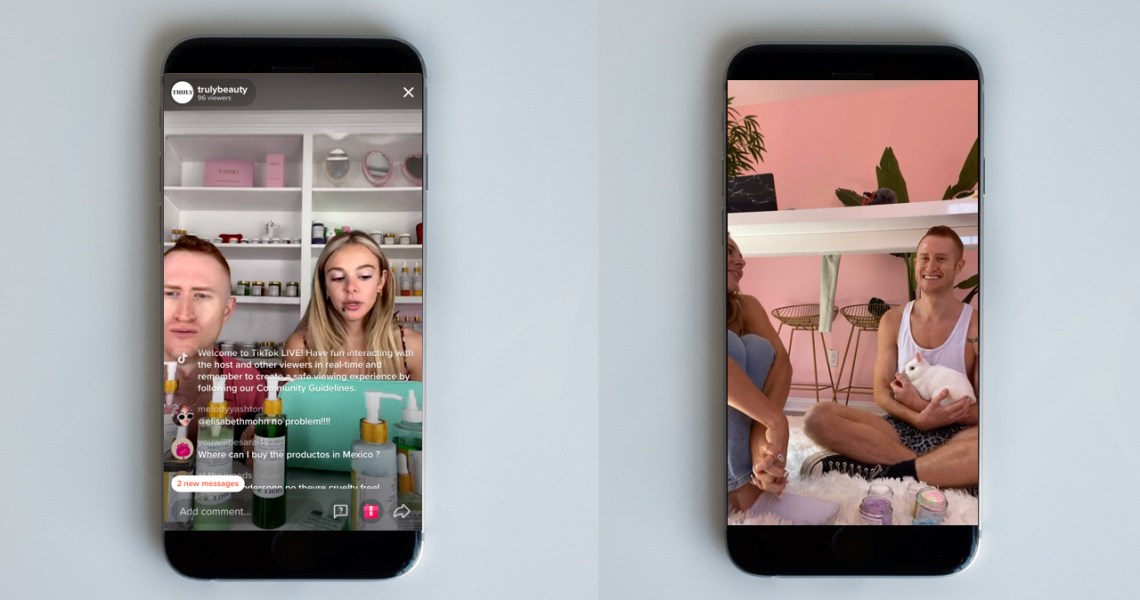On TikTok, the hashtag #iykyk (standing for “if you know you know”) has 5.1 billion views. #tellmewithouttellingme has 1.4 billion views. And while scrolling on the platform, it’s common to see users indirectly sharing specific experiences without describing them in detail or mentioning the names of involved people or brands — basically saying it without saying it.
Now, brands are tapping into the trend to connect with TikTokers. For example, to promote a new collection early this year, genderless fashion brand Flesh used the caption “Tell me you work in fashion without telling me you work in fashion” in a post featuring a video of models frolicking in colorful tulle dresses. In May, to market its spring 2021 swimwear line, Balmain paired a video of models wading across a pool. The caption: “Tell us where you want to be without telling us where you want to be.” The organic post garnered 65.5 views.
As Gen Zers are too savvy to fall for gimmicky ads, businesses are working to make their marketing undetectable. In May, indie retailer Mid May Boutique posted a TikTok promoting its athleisure assortment that centered on dressing like a “rich mom.” It went viral, garnering 116,000 views and driving more than 2,500 sales transactions. The featured athleisure styles sold out. Comments referenced the brand’s sly marketing, including, “I didn’t know this was going to be marketing related,” and “This might be the best promo ever.”
“As soon as you say #ad or sponsored post, people stop caring and start swiping,” said Youssef Hasweh, social media specialist for Gen-Z agency JUV Consulting whose clients include Unilever and VSCO. So brands are making ads less disruptive, putting content first and the product as an afterthought.
A spokesperson for TikTok echoed this sentiment in a business blog post by the company. “Don’t make ads, make TikToks,” they said. “We want brands to engage and create in the same way the community does. Authenticity and realness are preferred on TikTok, where advertising blends in with the content.”
Joe Binder, CEO of London-based personal branding agency WOAW, reiterated that brands should prioritize connecting with TikTokers authentically. “Before you have an opportunity to sell someone a product, you have to speak their language and get their attention,” he said.
Brand communications executive Amie Paige said the majority of TikTok content is value-added content, where consumers are always getting something out of the content they see. If they buy something featured on the platform, “they feel like it was a validated purchase, rather than just bought on a whim,” she said.
Ad position: web_incontent_pos1
Shadowbanning and government-ruled censorship laws have driven Gen Z TikTokers to be hypervigilant in what they say regarding topics such as mental health, politics and assault. To evade censorship, TikTokers will often get creative with emojis or purposely misspell controversial words, like typing “abuse” as “@ßüsé.” Such tiptoeing around words and topics has helped fuel a new way of talking online, including by brands in marketing.
Hasweh said this new way of communicating is necessary, in order to have important conversations. “There’s trust [on TikTok], because we’re all getting the same news at the same time,” he said. “It’s why we can be so secretive, because we all get it.”
According to Hasweh, brands can pull off secretive marketing on TikTok if it fits the brand and its audience. “The [brand] needs to be quirky or funny,” he said. “And it should interact with Gen-Z communities in ways that aren’t outside their norm.”
TikTok marketing has serious potential, as the app has seen 738 million downloads and, as of January 2021, grossed $177 million through worldwide advertising revenue. According to a March 2021 report by digital experience platform WP Engine, Gen Z represents spending power of $150 billion worldwide and will continue to shape the consumer market.




